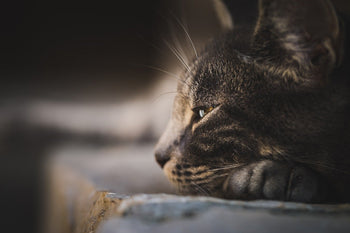Cats are fascinating creatures that have been domesticated for thousands of years. They are known for their independence, curiosity, and affectionate nature. Many cat owners wonder if their feline friends enjoy music as much as humans do. While there is no straightforward answer to this question, researchers have conducted studies and observations to shed light on this topic.
The Sensory Perception of Cats Cats have a unique sensory perception that allows them to detect sounds and vibrations that are inaudible to humans. They have a keen sense of hearing and can hear frequencies up to 65,000 Hz, which is much higher than the human hearing range of 20,000 Hz. Moreover, cats are sensitive to vibrations and can feel them through their paws and whiskers. This sensory perception plays a crucial role in how cats react to music.
Studies on Cats and Music Several studies have been conducted to investigate how cats respond to music. One study found that cats seem to prefer classical music over other genres, while another study suggested that cats are indifferent to music. However, these studies have limitations, and the results are not conclusive. Nevertheless, they provide insight into how cats perceive music and how it affects their behavior.
Does Cats Like Music? Exploring Feline Musical Preferences

Key Takeaways
Cats have a unique sensory perception that allows them to detect sounds and vibrations that are inaudible to humans.
Studies on cats and music have produced mixed results, but they provide insight into how cats perceive music and how it affects their behavior.
Creating a music playlist for cats can be a fun way to interact with them, but it is important to consider their sensory perception and preferences.
The Sensory Perception of Cats
Discuss How Cats Perceive Sound
Cats have a keen sense of hearing that is essential for their survival. They can perceive sounds that are beyond the range of human hearing, and their ears are highly sensitive to even the slightest movements. Cats have a unique ability to pinpoint the location of a sound source with remarkable accuracy, which makes them excellent hunters.
Explain the Range of Frequencies Cats Can Hear
Cats can hear a wide range of frequencies, from 45 Hz to 64,000 Hz. This range is much broader than that of humans, whose hearing range is typically between 20 Hz and 20,000 Hz. Cats are particularly sensitive to high-pitched sounds, which is why they can hear the ultrasonic frequencies that rodents and other small animals emit.
Mention How Cats Use Hearing
Cats use their hearing for a variety of purposes, including hunting, communication, and navigation. They rely on their sense of hearing to locate prey, avoid predators, and communicate with other cats. Cats also use their hearing to navigate in the dark, as they can detect the position of objects based on the sounds they make.
In conclusion, cats have a remarkable sense of hearing that allows them to perceive sounds beyond the range of human hearing. They can pinpoint the location of a sound source with remarkable accuracy and use their hearing for a variety of purposes, including hunting, communication, and navigation.
Studies on Cats and Music
Summarize Research Studies
Several studies have been conducted to investigate whether cats have a preference for music. One study conducted by the University of Wisconsin-Madison found that cats do respond to music, but their preferences are different from humans. Another study conducted by the University of Glasgow found that cats prefer music that is specifically designed for their species.
Highlight Findings on Music Preferences
The study conducted by the University of Wisconsin-Madison found that cats prefer music that has a tempo similar to the rhythm of their purring. This suggests that cats may have a preference for music that mimics the sounds they make themselves. The study also found that cats prefer music that has a lower frequency and simpler melodies.
The study conducted by the University of Glasgow found that cats prefer music that is specifically composed for them. The music was composed using sounds that are familiar to cats, such as purring and the sound of birds chirping. The study found that cats became more relaxed when listening to this music, suggesting that it has a calming effect on them.
Discuss Studies Limitations
While these studies provide some interesting insights into cats and music, there are some limitations to consider. For example, the sample sizes used in these studies were relatively small, which means that the findings may not be representative of all cats. Additionally, the studies did not investigate whether cats have a preference for different genres of music, which could be an interesting avenue for future research.
In conclusion, while cats do respond to music, their preferences are different from humans and are influenced by factors such as tempo, frequency, and the sounds they are familiar with. Further research is needed to fully understand the relationship between cats and music.
Observations of Cats' Reactions to Music
Share Personal Experiences
Many cat owners have observed their feline friends reacting to music in various ways. Some cats seem to be indifferent to music, while others show clear signs of enjoyment or discomfort. For example, some cats may start to purr or rub against their owners when they hear music they like, while others may hide or become agitated.
One cat owner reported that her cat would always come running when she played classical music, but would leave the room if she played rock or pop music. Another owner observed that her cat seemed to enjoy music with a slow tempo and soft melodies, but would become anxious when exposed to loud or fast-paced music.
Describe Common Behaviors
Cats have been observed to display a range of behaviors in response to music. Some common behaviors include:
Purring: Some cats may start to purr when they hear music they like, which could indicate that they find the music soothing or enjoyable.
Vocalizations: Cats may meow or make other vocalizations in response to music. This could be a sign of excitement or discomfort.
Movement: Cats may move in time with the music, such as swaying their heads or tapping their paws. This could indicate that they are enjoying the music.
Hiding: Some cats may hide or seek shelter when exposed to music they don't like. This could be a sign of discomfort or anxiety.
Explore Genre and Instrument Preferences
While cats may have individual preferences when it comes to music, some studies suggest that they may have a general preference for certain genres and instruments. For example, one study found that cats were more likely to show signs of relaxation when exposed to classical music than to heavy metal music. Another study found that cats were more likely to approach a speaker playing music with a higher frequency range, suggesting that they may prefer music with higher pitches.
In terms of instruments, some cat owners have reported that their cats seem to enjoy music with piano or string instruments, while others may prefer music with more percussive or electronic sounds. However, more research is needed to confirm these observations and determine whether cats truly have specific genre or instrument preferences.
Overall, while cats may have individual reactions to music, it seems that they are capable of responding to music in various ways. Further research is needed to understand the mechanisms behind cats' reactions to music and to determine whether music can have a positive impact on their well-being.
Creating a Music Playlist for Cats
Provide Playlist Creation Tips
When creating a music playlist for cats, it is important to consider their unique hearing abilities and preferences. Cats have a more sensitive hearing than humans, and they can detect higher frequencies. Therefore, it is recommended to choose music with high-pitched sounds and avoid songs with loud, sudden noises.
Another tip is to select music that has a slow and steady rhythm. Cats are naturally calm and relaxed animals, and they respond well to music that has a calming effect. Moreover, it is suggested to choose music that has a repetitive melody, as it can help cats to relax and fall asleep.
Suggest Calming Music and Sounds
When selecting music for cats, it is important to choose songs that have a calming effect on them. Classical music, such as Mozart and Beethoven, is often recommended as it has a soothing effect on cats. Additionally, nature sounds, such as birds chirping or water flowing, can also have a calming effect on cats.
It is important to note that not all cats have the same music preferences. Some cats may prefer more upbeat music, while others may prefer more relaxing sounds. Therefore, it is recommended to experiment with different types of music to see what works best for your cat.
Discuss Benefits of Music for Cats
Music can have several benefits for cats, including reducing stress and anxiety, promoting relaxation, and improving their overall mood. Playing music for cats can also help to stimulate their senses and keep them entertained.
Moreover, music can be beneficial for cats who suffer from separation anxiety or are recovering from an illness or surgery. Playing calming music can help to soothe their nerves and make them feel more comfortable.
In conclusion, creating a music playlist for cats can be a great way to provide them with entertainment and relaxation. By following these tips and suggestions, you can create a playlist that is tailored to your cat's unique preferences and needs.
Conclusion
Summarize Key Points
Throughout this article, it has been shown that cats have a unique response to music. Although some cats may not react at all, many cats have been observed to respond positively to certain types of music. It is important to note that each cat is an individual and may have different preferences when it comes to music.
Emphasize Enrichment through Music
Playing music for cats can provide a form of enrichment that can improve their overall well-being. Music can help reduce stress and anxiety, provide mental stimulation, and even encourage physical activity. It is important to choose music that is specifically designed for cats and to monitor their reactions to ensure that they are enjoying the experience.
Encourage Reader Participation
As a cat owner, it is important to experiment with different types of music and observe your cat's response. Pay attention to their body language and behavior to determine what types of music they prefer. Share your experiences with other cat owners and encourage them to try playing music for their cats as well. By sharing knowledge and experiences, we can continue to learn more about how cats respond to music and how it can benefit their overall well-being.
Frequently Asked Questions
What kind of music do cats prefer?
Cats have individual preferences when it comes to music, just like humans. However, studies have shown that cats tend to prefer music that has a slower tempo and a lower frequency range. Music that mimics natural sounds, such as bird chirping or purring, also tends to be more appealing to cats.
Is it common for cats to enjoy music?
While not all cats may enjoy music, it is not uncommon for cats to show an interest in music. Some cats may even display signs of relaxation or contentment when listening to music that they enjoy.
Do cats appreciate classical music?
There is no conclusive evidence that cats prefer any particular genre of music. However, some studies have suggested that cats may find classical music to be calming and soothing.
Can music affect a cat's behavior when they are alone?
Music can have a calming effect on cats when they are alone, especially if the music is slow and has a low frequency range. However, it is important to note that music should not be used as a substitute for social interaction and playtime with their owners.
How do cats react to different genres of music, such as jazz or rap?
Cats may have different reactions to different genres of music, just like humans. Some cats may prefer slow, calming music, while others may enjoy more upbeat and energetic music. It is important to observe your cat's behavior and reactions to different types of music to determine their preferences.
Should music be left on for cats when they are sleeping or resting?
It is up to the individual cat owner to determine whether or not to leave music on for their cat when they are sleeping or resting. However, it is important to ensure that the volume is not too loud and that the music is not causing any stress or discomfort for the cat.

















